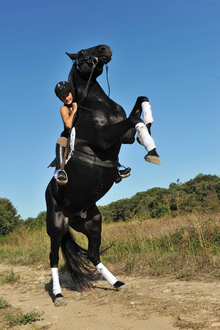New equine research by Charles Sturt University (CSU) academic Dr Petra Buckley suggests that obese horses and ponies are more likely to misbehave than their healthier and slimmer counterparts.

A misbehaving horse
New equine research suggests that obese horses and ponies are more likely to misbehave than their healthier and slimmer counterparts.
Dr Buckley’s research draws parallels with the obesity crisis in humans and raises the possibility that overweight ponies, just like obese children, could be ‘acting out’.
Veterinarians have long agreed that keeping horses’ weight in check is good for their health but who would have thought, that just like humans, weight and behaviour could be linked?
The study, ‘Misbehavior in Pony Club Horses: Incidence and risk factors’ involved 84 Pony Club horses from 41 families belonging to seven different clubs in rural Australia. Owners were asked to track issues such as horse housing, exercise, nutrition, healthcare, disease status, as well as any incidents of misbehaviour over a12-month period.
Misbehavior was classified as either dangerous or unwelcome behaviour. Dangerous behaviors included bucking, biting, bolting or kicking. Unwelcome behaviors were less aggressive acts of disobedience such as being difficult to catch, misbehaving in the trailer or ‘pulling like a steam train’.
The data showed 59 per cent of horses had at least one incidence of misbehavior. The likelihood of misbehavior was found to be higher in horses that were fat or obese. Those that were excessively fat were approximately three times more likely to display bad behavior, which was also more likely to occur when horses were competing; a time that puts more stress on rider and horse. Horses that were ridden less frequently were also more prone to bad behaviour.
The horses were regularly checked by a veterinarian to investigate if lameness or back pain, could have been contributing to their disobedience.
“My research demonstrates a link between nutrition, exercise, body condition scores and misbehavior,” Dr Buckley, from the School of Animal and Veterinary Sciences at CSU, said. “This is interesting because it moves the focus from the horse to how it is managed.
- Horses were more likely to misbehave when they were fed daily supplements, such as roughage, concentrates and/or grain
- Access to ‘good grass’ was also associated with increased risk of misbehavior.
The study has also made a number of key recommendations to prevent equine misbehavior. These include
- Exercising at least three times a week;
- Maintaining an optimal physique by more closely matching pasture and supplementary feeding to horses’ exercise levels and resulting energy requirements;
- Ensuring over-feeding does not occur.
“It must be remembered, that we did not measure the horse-rider bond, or the level of horse and rider education, and these are likely to contribute to horse behaviour,” Dr Buckley said.
“This study reflects the important role and responsibility of every horse owner when it comes to equine health.
“The take home message is that by paying close attention to diet and exercise, we can improve horse health and make horse riding more enjoyable and safer for kids.”
Press release provided by Charles Sturt University
